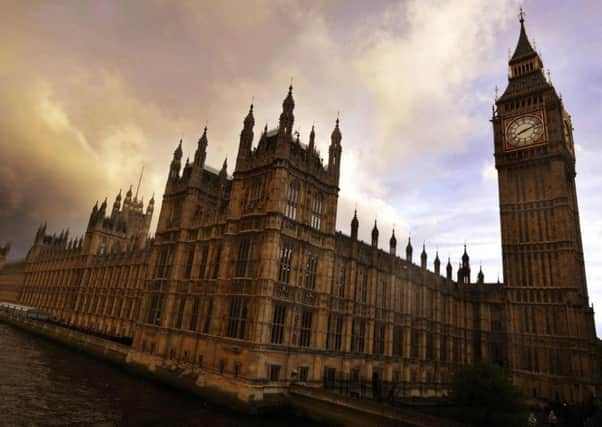Peers divided over bid to extend human rights protections to NI


MPs, in a free Commons vote last week, passed an amendment to emergency legislation which would require ministers to issue guidance to Northern Ireland civil servants to ensure compliance with UK abortion and same sex marriage legislation.
While the Northern Ireland (Executive Formation and Exercise of Functions) Bill is designed to partly address the governance vacuum created by the collapse of powersharing, and provide breathing space for the region’s rowing politicians to resume negotiations, Labour MPs Stella Creasy and Conor McGinn wanted to use it as a vehicle to deliver wider social change.
Advertisement
Hide AdAdvertisement
Hide AdAs the Bill arrived in the Lords for further consideration, peers reacted with a mixture of approval and concern over the implications for the devolution settlement.
Former Lib Dem leader David Steel, now Lord Steel of Aikwood, offered support for Ms Creasy’s amendment and said the current situation in Northern Ireland was “untenable”.
He added: “The fact is that during the Brexit negotiations we’ve been told we cannot have a line down the middle of the Irish Sea, affecting trade from one part of the United Kingdom to the other and yet we have a line down the middle of the Irish sea affecting human rights.”
Former lord chancellor Lord Mackay told peers that the Government had no power to alter abortion law in the region.
Advertisement
Hide AdAdvertisement
Hide AdHe said: “Abortion has been made a devolved subject and therefore the only statutory authority with authority to alter the statues and statutory instruments are the legislative Assembly of Northern Ireland.
“There’s no power whatsoever in the UK Parliament to interfere with that while it is devolved.”
DUP peer Lord Morrow later warned against “cherry picking” issues to legislate on from London.
He said: “We will strongly oppose any attempt to cherry pick and decide what should or should not happen in Northern Ireland.
Advertisement
Hide AdAdvertisement
Hide Ad“Abortion is a devolved matter and the legislation in Northern Ireland is the most up to date of any part of the United Kingdom, having been decided in 2016 on a cross-party vote, no petition of concern was used but a straightforward majority that the law should remain as it is.”
Lib Dem frontbencher Lord Bruce countered by saying there was a “huge amount of public support” for abortion reform in Northern Ireland as he told peers he supported the Creasy amendment.
Northern Ireland minister Lord Duncan, opening the second reading debate of the Bill, told peers he wished “the Bill itself was not necessary”.
He added: “We will not be waiting until March to bring the Northern Ireland parties together, following the passage of this legislation the Secretary of State intends to meet party leaders to discuss the basis, process and timing for further talks.”
Advertisement
Hide AdAdvertisement
Hide AdOn the issue of the Creasy amendment, Lord Duncan said it “does not alter the law”, adding: “These issues are devolved and should rightly be determined by an incoming assembly, but as I stated this clause does change the law in respect of the wider legal framework in respect of either.”
Former senior judge Baroness Butler-Sloss argued the change to the legislation backed by MPs “means absolutely nothing on abortion”.
The independent crossbencher said: “It will help no one, and it raises expectations with a clear misconception, misunderstanding and misinterpretation of what the clause will say when it inevitably becomes law.
“There has been a very well-meaning attempt by members of the House of Commons to circumvent devolution by putting in a clause that I cannot believe they thought would mean anything or would do any good.
Advertisement
Hide AdAdvertisement
Hide Ad“It is the expectation that has been raised that is so sad.”
Tory former Northern Ireland minister Lord Dunlop believed the Bill was “the least worst option” judged against the alternatives of holding another election or the reintroduction of direct rule.
He said: “In the absence of fully functioning devolved institutions, decisions crucial to the future prosperity and security of the people of Northern Ireland are simply not being taken.
“Nothing in this Bill will directly change this state of affairs. One can only hope this Bill can provide a space to facilitate a political resolution.”
Advertisement
Hide AdAdvertisement
Hide AdLord Maginnis of Drumglass told peers Ms Creasy’s amendment was “offensive”.
He said: “I am one who cannot accept that rights should have priority over what is right.”
The Independent Ulster Unionist added that he was “ashamed” that the UK “so casually relegated potential life to the incinerator”.
Baroness O’Loan, who served as Northern Ireland’s police ombudsman from 1999 to 2007, also spoke against the amendment.
Advertisement
Hide AdAdvertisement
Hide AdShe said: “Abortion, just to place on the record once again, is not a human right. There is a right to life, there is no right to kill the unborn child in the womb.”
Tory peer Baroness Stroud later added that the amendment “represents a serious overreaching of the powers of Westminster”.
She said: “It is not sensitive to the current reality of Northern Ireland politics.”